2023 was a landmark year for bar-setting video game releases. It wasn’t nearly as positive for the video games industry as a whole, but it’s hard to deny the sheer number of quality titles delivered to players last year. One hidden gem slid under the radar for most people because of this, but every whisper I heard about this game affirmed it shouldn’t be overlooked by anyone. Now, that game is officially available on Xbox — and I’ve already 100% completed it.
The game in question is Mediterranea Inferno, developed in tandem by Lorenzo Redaelli and studio EYEGUYS. It’s a choice-driven, narrative-centric visual novel with brutal and poetic writing, brilliantly vivid stylized visuals, and a poignant story that boldly tackles a variety of indescribably complex and eternally relevant topics. Yes, it is a text-based visual novel, so players that struggle to maintain interest in video games without complex gameplay mechanics can go ahead and wander off.
For everyone intrigued by the brief synopsis above, though, Mediterranea Inferno has already cemented itself as one of my top Xbox games of 2024, thoroughly permeating my thoughts since I rolled the credits.
This article was made possible with a review code provided by Santa Ragione. The company did not see the contents of this article before publishing.
Struggling to find hope in a broken world
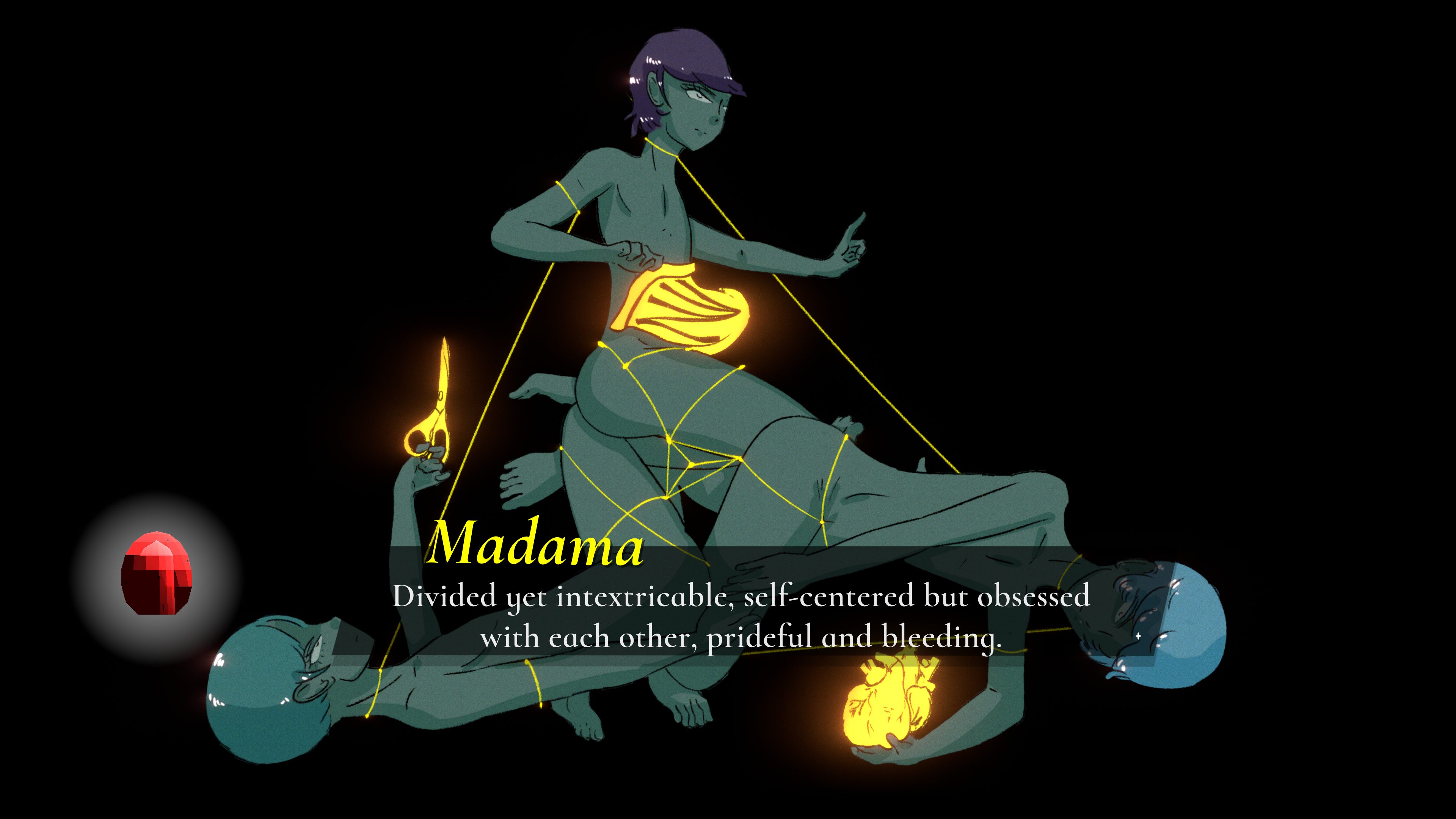
Mediterranea Inferno
• Price: $15 at the Microsoft Store (Xbox) | Steam (PC)
• Release date: Mar. 5, 2024 (Console) | Aug. 24, 2023 (PC)
• Developer: Lorenzo Redaelli / EYEGUYS
• Publisher: Santa Ragione
• Genre: Visual novel
• Playtime: 4-7 hours
• Platforms: Xbox, Windows PC (Steam), PlayStation, Switch
• Xbox Game Pass: No
• Played on: Xbox Series X
Claudio, Mida, and Andrea seemed unstoppable growing up. Attractive, charismatic, intrinsically privileged — these three queer men were brought together by the power they held as a group in the social circles of Milano, Italy. Cloistered in the deafening noise of endless parties and reinforced by the false invulnerability of immaturity, the Sun Guys (so named by the envious teens that surrounded them), bravely stood against the entire world.
They were oblivious to their faults and the inevitability of life, but their nascence was shattered by a two-year event most of the world was abruptly thrown into: the COVID-19 pandemic. Italy’s strict isolation laws saw the three boys separated for two entire years, forcing each into a state of secluded evolution that exacerbated their individual imperfections into full-fledged fatal flaws.
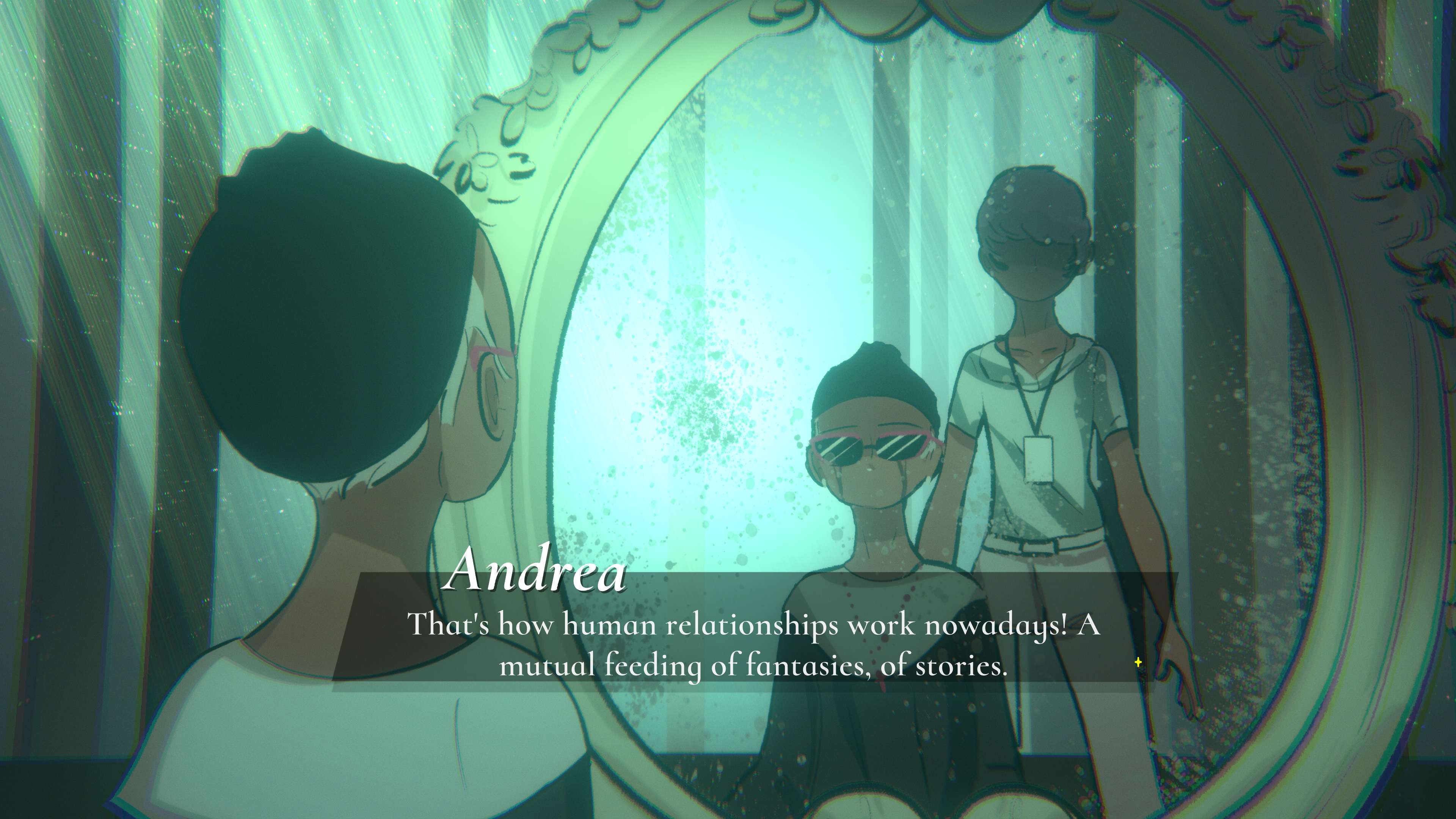
The pandemic broke the world. COVID-19 claimed literally millions of lives, irreversibly altering the economy and further dividing humanity. Particularly affected by this latter symptom were the younger generations, losing crucial developmental years to a disease that by its nature prevented socializing and connection. Even as the world began to emerge on the other side of the pandemic, the lingering effects settled in for the long haul; and we still aren’t fully aware of what these effects may be.
It’s in this world that Mediterranea Inferno is set, taking place in Aug. 2022. Claudio, Mida, and Andrea agree to a three-day summer vacation in Puglia, Italy to celebrate Ferragosto, a country-wide holiday that ends with the Assumption of Mary (an important date in the Catholic religion that celebrates Mary’s ascension into Heaven). On the surface, the three are seeking to return to the glory days of their pre-pandemic friendship, but the intervening years have created insurmountable wedges between the trio.
Seeking a flawed fantasy that doesn’t exist
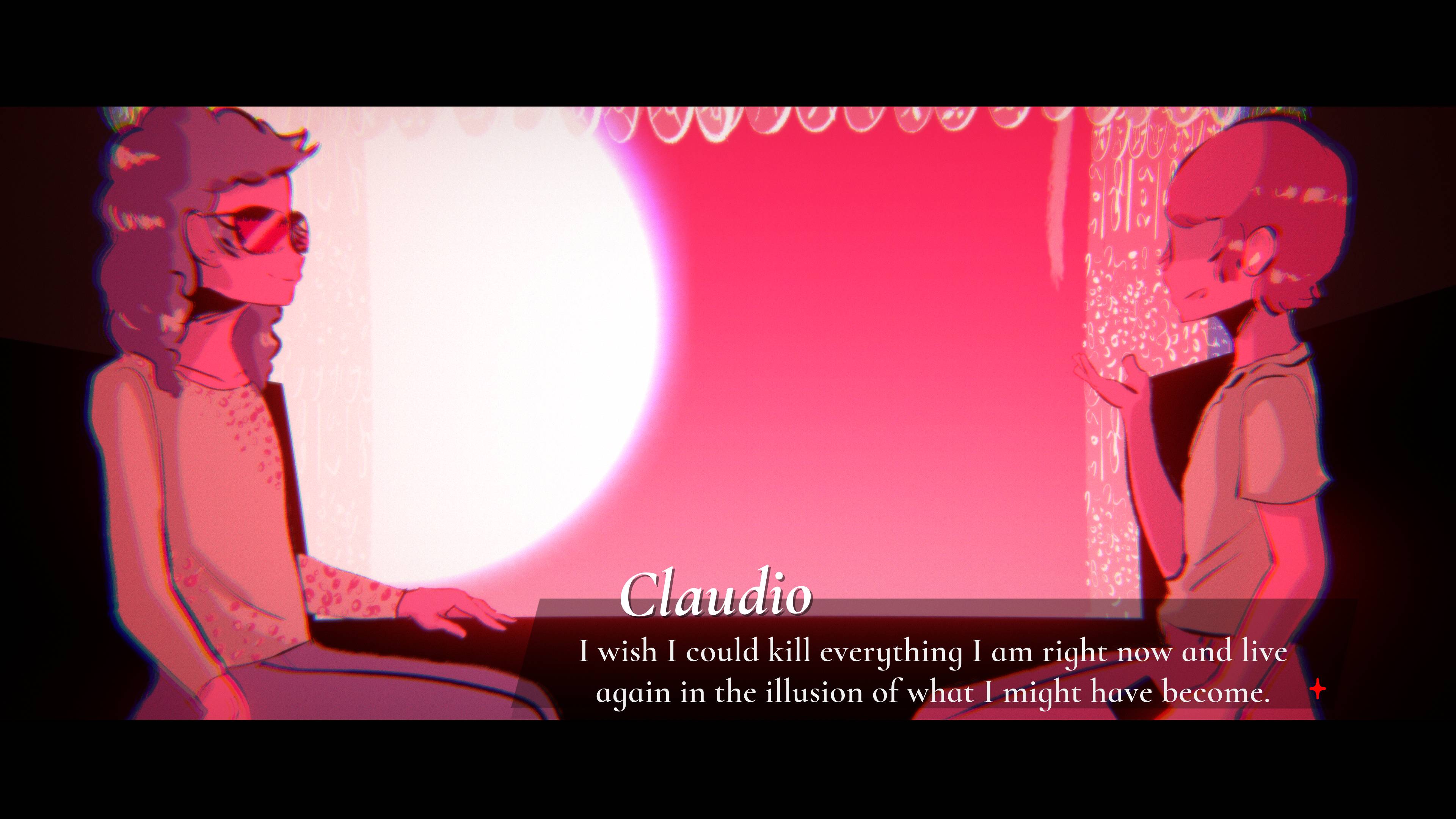
To be candid, I’m hesitant to say much more about Mediterranea Inferno beyond the setting. This game took any juvenile expectations I had and tore them to shreds, putting both my heart and brain into a brutal chokehold. It’s violent and dark, funny and relevant, beautiful and emotional. The writing is poetic and unrelenting in its savagery, laying bare a powerful perspective on what it means to be human in today’s world.
I understand if that may not be enough on its own to persuade you to play this game, though, so I’ll divulge the little I’m willing to on Mediterranea Inferno’s story. Each of the three main characters, Claudio, Mida, and Andrea, are deeply flawed and exaggerated tokens of a different facet of life, and the interplay between these ideals leads to a duplicitous, selfish conflict within the group.
Claudio struggles to imagine a future in a world that’s so irrevocably devastated by generations that won’t have to face the consequences of their decisions, and turns that bitterness into an obsession for the “golden days” that never existed. Mida has suffered under years of perceived ostracization, feeling diminished in the eyes of those around him (including his closest friends), and internalizes that into a desperate need for utter control and independence. Andrea yearns for constant connection and validation, an addiction that fills him with an ever-present, aching loneliness and an inability to find happiness by himself or with his own love.
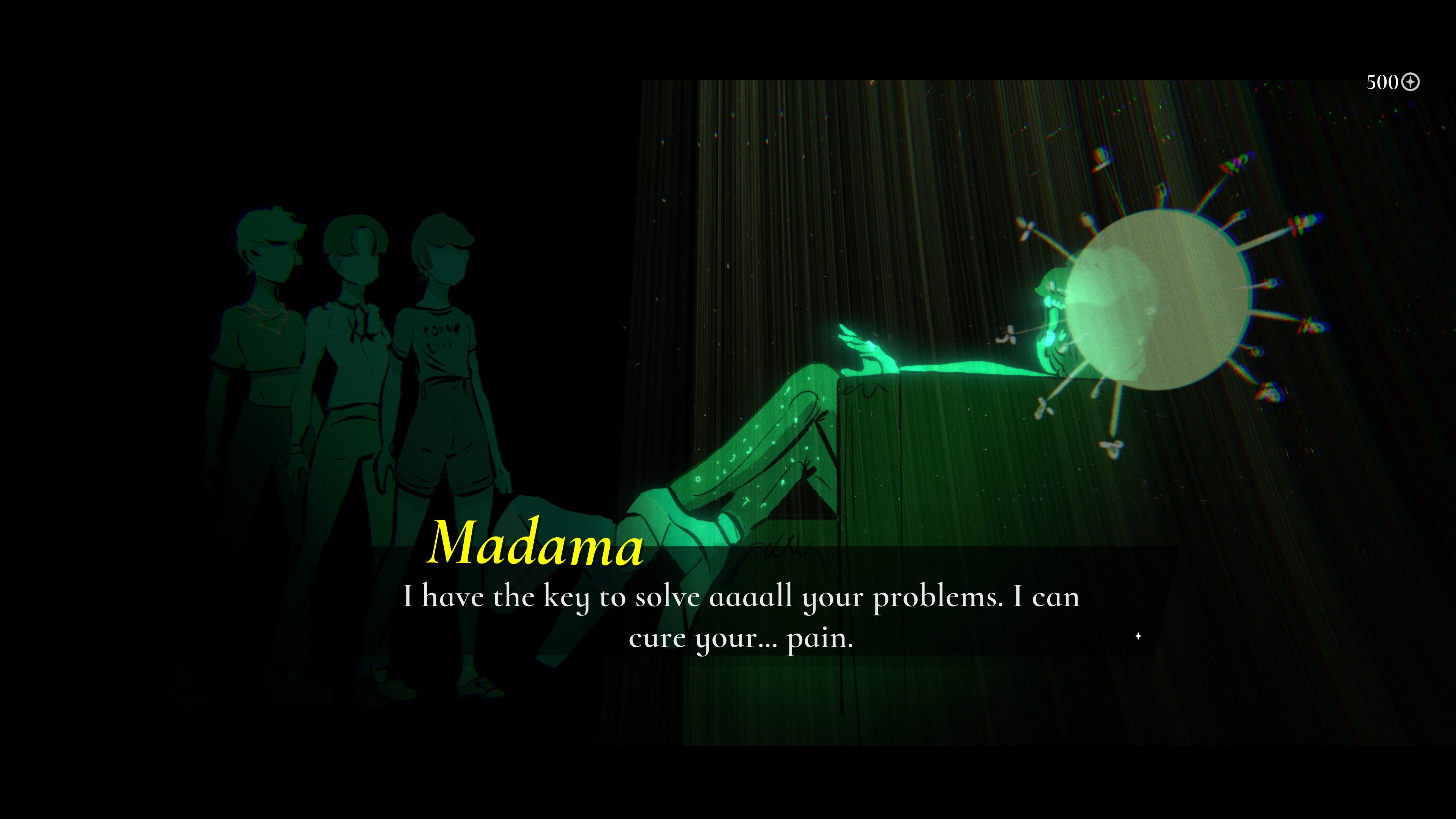
At this point, Mediterranea Inferno detaches itself from the real world to further explore these concepts to their extremes; each of us struggle with all of this at one point or another, but Claudio, Mida, and Andrea have been consumed by their respective issues. They’re unable to see outside their perspective, refuse to communicate, and instead hunger for a world in which they can enable their worst selves without repercussion.
A mysterious entity imposes itself on their summer vacation, promising a Heaven of their making as long as they partake in the Fruit of Mirages. These Fruits take the boys into the deepest recesses of their subconscious, a sliver of their nonexistent fantasy that could be made reality if only they make their desires stronger and more indomitable than those of their friends. You dictate the choices the group makes over three days, ultimately deciding the fate of all three.
There is a plethora of secrets, branching paths, and different endings to discover in Mediterranea Inferno. Some are desolate and heart-wrenching, others are drenched in horror and existential dread, and more still reflect the simple sadness that’s a natural part of existence.
Capturing just some of the complexities of life
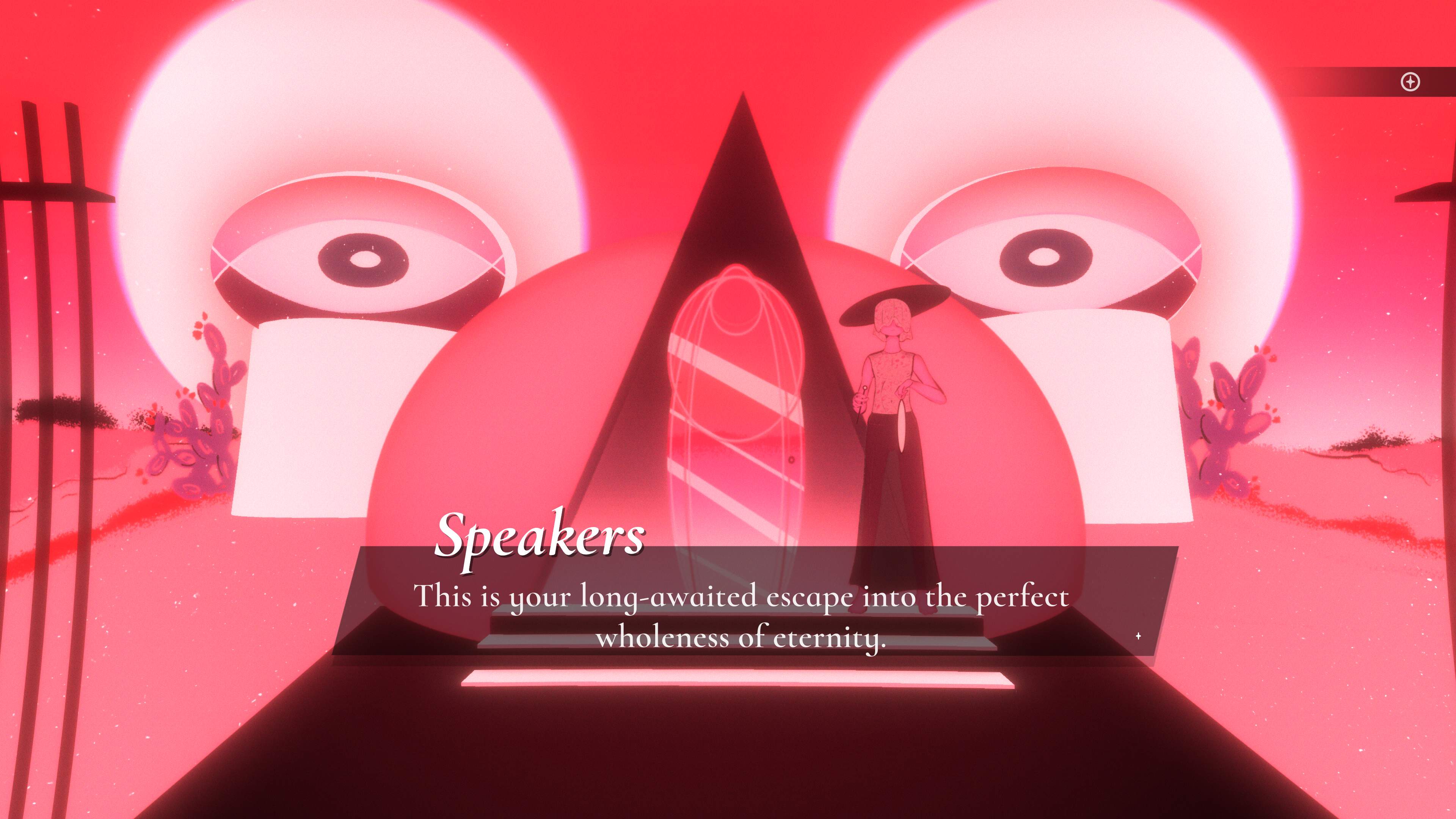
Life is full of contradictions, and the youngest generations growing up in this complex, chaotic world embody those contradictions more than any other. Love and obsession, independence and loneliness, community and division, enjoyment and consumption — the future generations of any given era shift the balances between these opposing ideals.
In a society simultaneously more divided and interconnected than ever, that has never been more evident. Mediterranea Inferno explores the struggles of the younger generations (of which I am a part) in a world freshly shattered by the still-lingering COVID-19 pandemic. The lens through which it does so is mystical, cloaked in grandeur and impossibility, but the message it tells is potent and devastating in its impact.
The visuals and art design are wildly gorgeous, striking you with vivid scenes of neon swathes and twisting lines. The soundtrack is flexible, molding into each scene and environment with subtlety and emotion. The myriad side paths and miniature stories you can discover keep you interested even when they have little to no bearing on the end results. Mediterranea Inferno doesn’t land every punch perfectly, but it’s a brazen, shameless allegory on sociality, sense of self, sexual and gender identity, inclusivity, independence, history, and so much more.
It’s also only $15 at the Microsoft Store (Xbox), and is now available on Xbox Series X|S, Xbox One, Windows PC, PlayStation, and Switch. Mediterranea Inferno is ultimately a short game (I got my first ending in 4 hours and effectively 100% the game in around 7½ hours), but it certainly makes a loud impression in that short timeframe. Just go play it. 10/10.





